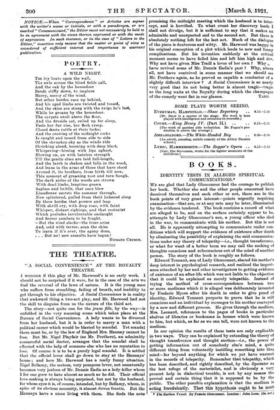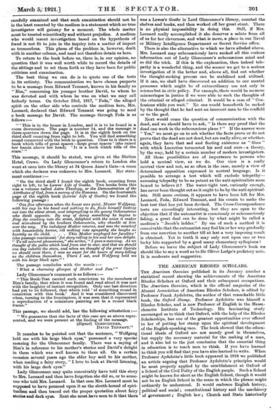BOOKS.
IDENTITY TESTS IN ALLEGED SPIRITUAL COMMUNICATIONS.*
WE are glad that Lady Glenconner had the courage to publish her book. Whether she and the other people concerned have deceived themselves and each other or not, there are in the book points of very great interest—points urgently requiring examination—that are, or at any rate may be later, illuminated by the evidence tendered. The book contains a record of what are alleged to be, and on the surface certainly appear to be, attempts by Lady Glenconner's son, a young officer who died in the war, to communicate with his mother. But this is not all. He is apparently attempting to communicate under con- ditions which will support the evidence of existence after death by eliminating the possibility of explaining the said communica- tions under any theory of telepathy—i.e., thought transference, or what for want of a better term we may call the sucking of thoughts conscious and subconscious out of the mind of another person. The story of the book is roughly as follows.
Edward Tennant, son of Lady Glenconner, shared his mother's deep interest in psychological research, and realized the import- ance attached by her and other investigators to getting evidence of existence of an after-life which was not liable to the objection that it could be explained as merely telepathic. Instead of trying the method of cross-correspondence between two or more mediums which it is alleged was deliberately invented by Frederic Myers after his death in order to give proof of identity, Edward Tennant purports to prove that he is still conscious and an individual by messages to his mother conveyed by a new and different process. He gives through the medium, Mrs. Leonard, references to the pages of books in particular shelves of libraries or bookcases in houses which were known to him, but which, as far as we can tell, were not known to the medium.
In our opinion the results of these tests are only explicable in two ways. They can be explained by extending the theory of thought transference and thought suction—i.e., the power of getting information out of somebody else's mind, a quite different thing from voluntarily instilling something into that mind—far beyond anything for which we yet have warrant
in the records of telepathy. Remember that telepathy, which has been described, and rightly described, by the Spectator as the last refuge of the materialist, and is obviously a very present help in dialectical trouble, is not by any means the proved and certain thing that it is supposed to be by the public. The other possible explanation is that the medium is acting fraudulently. That this hypothesis ought to be most • The Earthen Vessel. By Pamela Glenconner. London : John Lane. Oa. net.]
carefully examined and that each examination should not be in the least resented by the medium is a statement which no true investigator will gainsay for a moment. The whole matter must be treated scientifically and without prejudice. A medium who would resent investigation based on the hypothesis of fraud is not fit to join in the inquiry into a matter of import so tremendous. This phase of the problem is, however, dealt with in another column, and need not therefore detain us here.
To return to the book before ne, there is, in our opinion, no question that it was well worth while to record the details of
the sittings and to set them forth as they have been for public criticism and examination.
The best thing we can do is to quote one of the tests in its entirety. The communication we have chosen purports to be a message from Edward Tennant, known in his family as " Bim," concerning his younger brother David, to whom he was devoted and with whom he was on what we may call fatherly terms. On October 23rd, 1917, " Feda," the alleged spirit on the other side who controls the medium here, Mrs. Leonard, declared that Edward Tennant was going to send a book message for David. The message through Feda is as follows:
" This is in the house in London, and it is to be found in a room downstairs. The page is number 14, and the message is three-quarters down the page. It is in the eighth book on the third shelf counting from right to left. You will find something round connected with the book in question. Close to it there is a book which tells of great spaces —large great spaces ' (she raised her hands above her head). It is a book which tells of the stars.' "
This message, it should be stated, was given at the Station Hotel, Crewe. On Lady Glenconner's return to London she went at once into the library at 34 Queen Anne's Gate—a room
which she declares was unknown to Mrs. Leonard. Her state- ment continues :— " On the third shelf I found the eighth book, counting from right to left, to be Lewes' Life of Goethe. Two books from this was a volume called Astro Theology, or the Demonstration of the Attributes of God, from a survey of the Heavens. On the fourteenth page of the eighth book (Lewes' Life of Goethe) we found the following passage : ' One fine afternoon when the house was quiet, Master Wolfgang, with his cup in his hand and nothing to do, finds himself looking out into the silent street, and telegraphing to the young Ochsensteins who dwelt opposite. By way of doing something he begins to fling the crockery into the street, delighted with the noise it makes and stimulated by the brothers Ochsenstein, who chuckle at him over the way. The indulgent Mother returns, and sees the mischief with housewifely horror, till melting into sympathy she laughs as heartily as the child. . . . This Mother employed her faculties' (the passage continues) for story-telling to his and her own delight. To all natural phenomena,', she writes, " I gave a meaning. As we thought of the paths which lead from star to star, and that we should one day inhabit the stars, and when we thought of the great Spirits we should meet there, I was as eager for the hours of story-telling as the children themselves. There I sat, and Wolfgang held me with his large black eyes." '
The passage concludes with the words :-
' What a charming glimpse of Mother and Son."
Lady Glenconner's comment is as follows :-
" This Book-Test carried such conviction to the members of Bim's family, that when it was found and read aloud it was met with the laughter of instant recognition. Only one last direction had yet to be followed, that which told ' of something round in connexion with this book.' And it was considered discovered when, turning to the frontispiece, it was seen that it represented a reproduction of a miniature painting set in a round black frame."
This passage, we should add, has the following attestation:— "We guarantee that the facts of this case are as above repre- sented, and we were present at the finding of the message.
(Signed) Gr.exicoNNEn, DAVID TENNANT."
It remains to be pointed out that the sentence, " Wolfgang held me with his large black eyes," possessed a very special meaning for the Glenconner family. There was a saying of Bim's in reference to his mother's stories and David's delight in them which was well known to them all. On a certain occasion several years ago the elder boy said to his mother, when reading a fairy story, " I love to look at David listening, with his large dark eyes."
Lady Glenconner may quite conceivably have told this story to Mrs. Leonard and then have forgotten she did so, or to some- one who told Mrs. Leonard. In that case Mrs. Leonard must be supposed to have pounced upon it as the sleuth-hound of spiri- tualism and then traced out the proper quotation about fairy stories and dark eyes. Next she must have seen to it that there
was a Liaree's Goethe in Lord. Glenconner's library, counted the shelves and books, and then worked off her great stunt. There is no physical impossibility in doing this. Still, if Mrs. Leonard really accomplished it she deserves a salute from all of us for her cleverness, and what is more, a place in our Naval or Military Intelligence Department or Secret Service office.
There is also the alternative to which we have alluded above. Mrs. Leonard may subconsciously have sucked all this curious information out of Lady Glenconner's subconscious mind and so did the trick. If this is the explanation, then indeed tele- pathy is a wonderful thing, and the sooner we get to a serious investigation of it the better and, above all, find out whether the thought-sucking process can be stabilized and utilized. If it can, we shall have discovered an addition to our mental processes which might be of extraordinary use not only in science but in civic policy. For example, there would be no more miscarriages in justice if we were able to suck the thoughts of the criminal or alleged criminal. It would be a case of " Con- fessions while you wait." No one would henceforth be racked by the thought that he had sent an innocent man to the scaffold or to the gaol.
Next would come the question of communication with the dead, and we should have to ask, " Is there any proof that the dead can work in the subconscious plane ? " If the answer were " Yes," we must go on to ask whether the facts prove or do not prove that the dead are not dead, but are really alive, or whether, again, they have that sad and fleeting existence as " films " with which Lucretius tormented his soul and ours—a theory, by the way, held by a certain number of modern investigators.
All these possibilities are of importance to persons who hold a neutral view, as we do. Our view is a really neutral view and not, as so often is the case, merely a view of determined opposition expressed in neutral language. Is it pcsaible to arrange a teat which will exclude telepathy— assuming telepathy to be as potent as the anti-spiritualists seem bound to believe it? The water-tight test, curiously enough, has never been thought out as it ought to be by the anti-spiritual- ists. Still more curious, it appears to have been left for Mrs. Leonard, Feda, Edward Tennant, and his cousin to make the best test that has yet been devised. The Cross-Correspondence tests are exceedingly interesting, but they are open to the objection that if the automatist is consciously or subconsciously faking, a great deal can be done by what might be called a medium's " Jacob's ladder." By use of such a method it is conceivable that the automatist may feel his or her way gradually from one assertion to another till at last a very imposing result is obtained. Yet in truth it may only rest upon one or two lucky hits supported by a good many elementary syllogisms 1
Before we leave the subject of Lady Glenconner's book we should like to say a word as to Sir Oliver Lodge's prefatory note. It is moderate and suggestive.



































 Previous page
Previous page